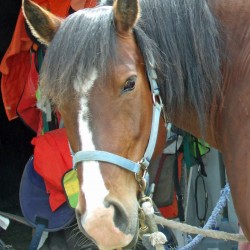Why Do Veterans Find Healing with Horses?
From the Bangor Daily News-Community Section (6/17/14); by Nancy Dumond Violette, President

For more reasons than we know so far. In physical therapy, working around horses is calming and motivating; mounted work simulates walking, as well as integrating senses to develop better overall coordination. Many vets are turning to Equine Assisted Learning (EAL) and Equine Assisted Psychotherapy (EAP) for help with Post Traumatic Stress Disorder (PTSD) and Traumatic Brain Injuries (TBI).
PTSD and TBI are not visible but are chronic. There is no cure. Many treatments are aimed at saving lives and families from the devastating national suicide rate of 22 per day and escalating divorce rates across the US. Most traditional treatments take place in office settings and often include psychotropic drugs. Alternatively, vets have found everything from yoga to fishing, helpful. During the past decade, the use of horses has become popular. Programs range from once a month barn visits including chores and grooming to weekly riding and/or EAP/EAL. According to vets participating in equine programs, the effects are incredibly positive. Retired Navy SEAL, Robert Foley, has made it his mission to share how effective equine therapy is for veterans. His videos are very well said.

The role of the horse and warriors has come full circle from the days of physically and mentally carrying men into battle, to present partners in physical and mental healing. Since the horse, a prey animal by nature, has profound intuitive radar and is always on hyper-alert, veterans can often relate to their (horses) wanting to know what is behind a rock or tree, appreciating that horse ‘know’ more of what is within five miles than man. Horses are naturally adept at letting people know how their behaviors and emotions, even hidden emotions, are affecting those around them. Veterans often find partnering with horses to help them in relationships and communication well beyond the farm.
Many people who have experienced trauma are relaxed by the horse’s movement when mounted; stimulating areas of the brain that involve processing, decision making, fear, and response. The Horses and Humans Research Foundation is presently funding research on the effects of Equine therapy for veterans with PTSD The site is also loaded with documentation of ways horses can help children, adults, and families become more healthy.
Where does a veteran find a horse? Sometimes right in a neighbor’s back yard. In Aroostook, a small Equine Assisted Learning farm in Van Buren invites vets to come pet a horse at ’Open Horse’ (open house) monthly visits, with the option of scheduling more time for a variety of activities. June ‘Open Horse’ is Wed 6/18, 6-7:30 pm at Perfect Ponies Learning Center (PPLC), 489 Main St. There is no cost to vets and families. For individual visits or more information: Nancy Dumond Violette, 868.5324, ponygirl489@msn.com or follow PPLC on Facebook.
